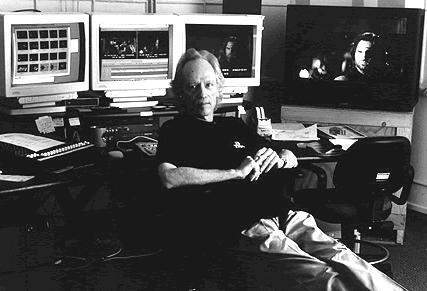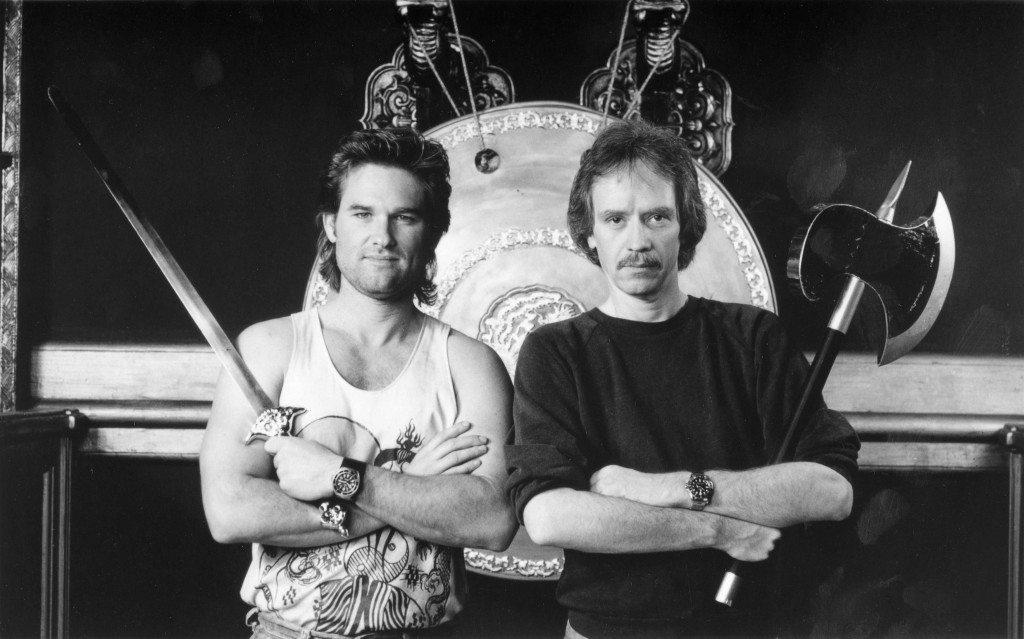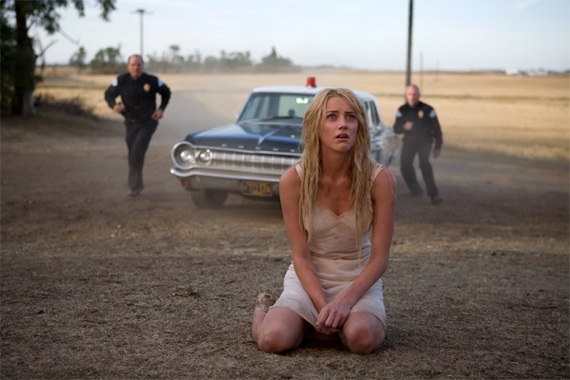
Generally speaking, I don’t like doing interviews over the phone. Especially short interviews. They’re impersonal enough as is, without the added hurry of a time crunch. But I jumped at the chance to talk, however briefly and impersonally, with John Carpenter. The man is a flat out living legend, and one of the best genre filmmakers cinema has ever seen. How could I not talk to him? Even if we ended up having a completely inane conversation that was little more than promotional lip service for The Ward, his first new theatrical directorial effort in a decade. I was fine with that. Honestly, I was just happy to get him on the phone. So it was all icing when Carpenter turned out to be an utter delight to talk with, not only willing to answer some of my stupider questions, but seemingly eager to do so. I suspected I might be pleasantly surprised when the conversation began with Carpenter asking me a question.
Oh, and if you don’t know who John Carpenter is, you should leave CHUD immediately. Educate yourself. We’ll greet you with a warm embrace upon your return. I’d like to help you out, but CHUD isn’t a remedial education site. Giving your special needs extra attention wouldn’t be fair to the rest of the readers.
Onwards!
John Carpenter: Hey man, how’s it going?
Josh: Oh, not too shabby.
Carpenter: Where are you?
Josh: Where am I?
Carpenter: Yeah.
Josh: Hollywood.
Carpenter: Yes! That’s what I’m talking about.
Josh: How about yourself?
Carpenter: Same place, dude.
Josh: Well, alright. Just a couple Hollywood players, shooting the shit. I guess let’s start with the most obvious question. Aside from some Master of Horror episodes, you’ve been out of the directing game for a full decade now. I have to assume that various projects floated your way during your sabbatical — what was it about The Ward that finally lured you back into the system?
Carpenter: Yes, I did occasionally get a script. But a lot of them were just awful. After I made the two Showtime episodes of Masters of Horror, I thought, well that was nice. I could go back for more. Cause I had a good time. It would be nice to have some fun again. Then The Ward came along; I read it; it needed a little bit of work, but the story kind of did what I was interested in doing. A low budget film with a small cast — a ghost story, in a mental institution, and I thought, well on its face this could be really interesting. So that was the basic draw.
Josh: The vast majority of your movies have a very strong Western vibe, and you are clearly influenced by the Western genre. Do you have any interest in making an outright Western?
Carpenter: Oh, sure. Yeah. I’m actually working on a little Gothic Western right now.
Josh: Is that something you’re comfortable talking about here?
Carpenter: It isn’t set up yet. It’s still being written. You never know about the future in this business, so I don’t know if I’ll end up doing it or not, but it’s an interesting idea. I think I could do something with it. I’d love to make a Western!
Josh: What’s the basic premise of the film?
Carpenter: Well it’s based on a true story. Takes place in 1871. Just go on-line and look up the Bloody Benders. [The basic gist is about a family who run a remote inn, where they prey upon wealthy travelers, robbing and murdering them.]

Josh: Unfortunately, many of the American DVDs for your films don’t contain an audio commentary from you. I realize you have no control over such things, but have you ever considered recording some commentaries yourself and making them available on iTunes?
Carpenter: (legitimately intrigued) I had never thought about that. That’s a great idea! That would work?
Josh: Yeah, people would just download it, drop it onto their iPod or whatever, then listen to it while watching the DVD.
Carpenter: That’s all there is to it?
Josh: Ha. I don’t know all the ins and outs, but basically, yeah. I definitely think there is at least a small market for such a thing.
Carpenter: Well one thing I would have to overcome, is my huge proclivity towards being incredibly lazy.
Josh: I can certainly related to that. So how – and I’m trying to phrase this so it doesn’t sound like an insult, which it really isn’t meant to be – but how much would you say your time away from directing was caused by this laziness? By a desire to just be living your life and playing video games?
Carpenter: That is the very secret of my existence. It is so definitely true. See, I realized that I wasn’t having any fun. I was working too hard. And I thought, this is ridiculous! Why am I doing that? I’m an old guy now.
Josh: I’d say you put in your time. You paid your dues.
Carpenter: Exactly right. Why can’t I have some fun?
Josh: You’ve gone on the record before, regarding your love of video games. Are there any games that you’ve played that made you stop and think, “Man, this would make a great movie.”
Carpenter: Dead Space. BioShock. Both would make great movies.

Josh: Your son Cody has been dabbling in music. Does he have any aspirations involving making movies?
Carpenter: You know, I’m not sure. He might. He was teaching in Japan for a while. He’s now returned. Thank god he returned before the earthquake hit. Right now he’s taking it easy. I might work with him again. He and I play music for our own fun; getting together once a week to record something.
Josh: Were you at all tempted to do music for The Ward?
Carpenter: That’s real work. That is hard work. You gotta realize, if you develop a script, then you go into pre-production, then production, and then you edit for six to eight months, and then you’re going to go into the recording studio to do music? All these young geniuses out there, they can do it. Not me.
Josh: You feel that’s a younger man’s game?
Carpenter: My friend, the world is a younger man’s game.
Josh: Speaking of younger days — any chance of you reteaming with Mr. Kurt Russell any time soon?
Carpenter: Well, he’s so rich now I don’t think he needs to work with me anymore.
Josh: Awwww…
Carpenter: We’ve talked about it. Given the right circumstances, and the material, if we agree on it. Yeah.
Josh: So with this much time away from a full feature-length production, was jumping back in the director’s chair like riding a bike? Or did you have to get back up to speed? Has anything changed, from your perspective?
Carpenter: The basics of moviemaking, of cinematic storytelling, haven’t really changed. The studio system perfected it in the 30’s. You have a camera, a cast, a crew, lights, you’re on a location or you’re in a sound stage. Night or day. And the director just says, “Let’s make a scene.” And that hasn’t changed. What’s changed a lot is the technology now available. Technology has come a long way since the early days. And the studios are owned by different kinds of folks now. So some of the motivations to make movies are different than they were in the old days. A lot of that has changed. And the audience has changed a great deal because of all the cable channels, and the Internet, and phones that show you movies; all this stuff. It’s amazing.
Josh: Did you have fun this time? Now that you took a break?
Carpenter: Yes, very much so.
Josh: Have you been reborn? Are you eager to make another one? Or are you eager to have some more time off again?
Carpenter: Oh, I never think I have too much time off. Believe me. I love having time off. Right now I’m obsessed with the NBA basketball finals. Even though my Lakers did not do that well. And of course I’m pimping The Ward. Plus I have several projects in development, and what that means is that either it is being written or money is trying to be raised for it.
Josh: So. Let’s close this out with a real meaty question… Five game suspension for Andrew Bynum; too tough, or not tough enough?
Carpenter: I think that’s about right. That was the cheapest of cheap shots. I mean, just cheap. You don’t have to do that. Big guys, you don’t ever take down little guys. I know he was frustrated, just tired of that guard driving in past everybody and laying it in. I understand that. But you don’t have to hit him with a forearm. So I think it is probably about right. It was a cheap, cheap shot.